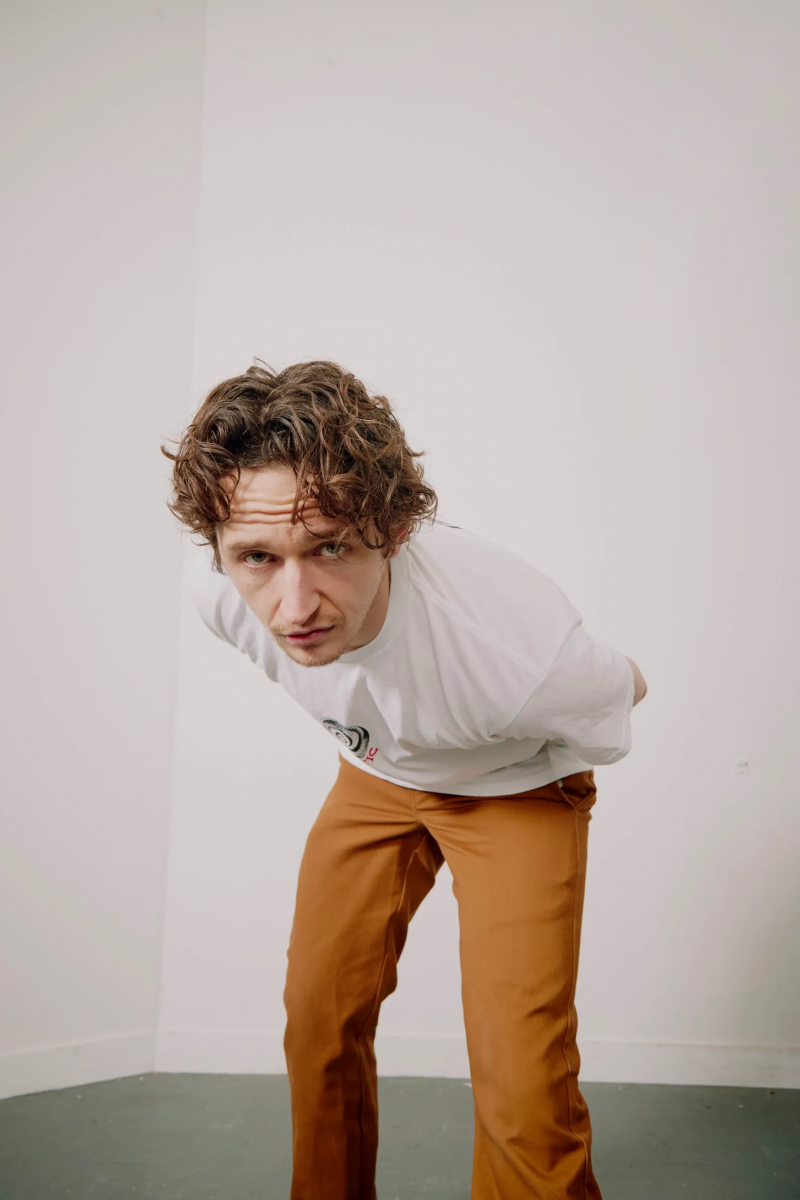
When you think of Russia, comedy isn’t the first thing that springs to mind. In fact, it’s probably the last.
But there’s a lucrative stand-up scene where comedians can make £1,000,000. That’s a far cry from the crumbs Edinburgh Fringe comics make – but Russian comedians are also Putin’s mouthpiece.
Milo Edwards started his comedy career like many do, at the Cambridge Footlights. But his trajectory since then has been far from normal. After university in 2015 Milo moved to Russia, where he ended up performing as a stand-up comedian on TV.
Yes, he did make jokes about Putin. And no, you absolutely can’t now.
‘I taught myself to speak Russian at university. One of my good friends from my course was a Russian guy. I went to Moscow a couple of times with him, so I got interested in it,’ Milo tells Metro.co.uk at the Edinburgh City Cafe – a bit of a Fringe institution.
‘I thought if I got to Russia for a year I will be fluent. So I did, then I got scouted on the stand-up in English in a bar in Moscow for this job on Russian TV.’
Wait, what?
‘I had a screen test and I got on this show, which was kind of like the American show, Last Comic Standing,’ Milo explains. ‘It was a competition and I came second in that, then it went into a show which is their equivalent of Live at the Apollo. I did that for two years then came home.’

Yes, he performed stand-up comedy in Russian. On TV.
Just the day before we chatted, Milo had bumped into a friend from his time in Russia.
‘I yelled his name to him in Russian, he looked terrified and like he was about to be arrested,’ quips Milo, whose show How Revolting! Sorry to Offend is at the Edinburgh Fringe until the end of the month. (It’s whiplash smart, funny, and explores class in the UK – not Russian politics.)
Milo is tempted to describe the stand-up comedy scene Russia nine years ago as ‘primitive’, but thinks it’s not quite the right word.
He explains: ‘It’s so new there. They only started having stand-up on TV in maybe 2012. So no one in Russia really knew what it was until then. Then it became immensely fashionable but there was no culture of stand-up to back it up.
‘So they had a few comics who were on TV. It was going through this developmental stage that we had here in the 70s or 80s with one-liners.
‘But then you’d have those comics going to the West and seeing what other comics were doing. So you’d sometimes have something straight out of the 80s but inflected with these weird postmodern Stewart Lee-style touches.’
While Moscow audiences were generally fine, it became ‘varied’ as you got to the more isolated Russian towns and cities.
‘One time I was doing a gig in this town in Russia which was the but of the ‘s**t town’ jokes.
‘It has a McDonalds, so it was fine. Well, it did have a McDonalds, not anymore. That’s generally a mark of safety in Russia. If there’s no McDonalds you’re f***ed.’
Anyway, Milo was performing in a restaurant there – a favourite venue for stand-up comedy in Russia, I’m told.
‘There were 300 people sitting at tables in a dining hall. It was a mixed bill, with stand-up and singing. I had to go on after this act which was two women in leotards pole dancing either side of an old lady singing Soviet ballads.’
Russian gigs were more fun than the English ones, Milo says. Most Russian people wouldn’t go to English-speaking gigs to laugh, but would simply applaud if they understood something. They were a training ground for audiences to practice their English.
In 2015, comedy was censored in Russia – but not in a wholly political sense.
‘In live work, you could pretty much say what you want. I don’t think that’s the case these days. I think people have definitely been arrested for stuff they say live in the last few years.
‘But at the time no one cared about anything you said live. On TV it was censored but mostly for socially conservative reasons.

‘They would be careful if you were talking about sex, drugs, gay stuff. Anything like that. It was mostly because it would upset the viewers, not the government.’
But there was one bizarre rule which meant Milo and his fellow comics could talk about drugs, but couldn’t give people advice on how to take drugs.
‘People would say I indulged in cannabis, so you couldn’t say you smoked it because that would be instructing people on how to take it,’ chuckles Milo.
‘I remember you could make Putin jokes, because the people who loved Putin loved him so much that a Putin joke will be read in the opposite direction. You could play both sides.
‘I made a joke on TV once, I was talking about sh***y Russian restaurants. It’s kind of a hack joke, but I said: “You know when they bring out some pie and you don’t know whether it’s pork, beef, or the last guy who made a joke about Putin.”
‘People who don’t like Putin laugh, because they’re like, he murders people. But people who do like Putin laugh because they’re like, how ridiculous, he would never murder anyone. Or he does murder people and it’s good,’ Milo explains.
Milo left in 2017, and most of his friends moved away after Russia invaded Ukraine in 2022 – but a few have stuck around for their ‘footballer salary’.
‘They couldn’t say no to the money,’ Milo explains. ‘There was a lot of money in it before, and I think because they were worried about people leaving after the war, because so many people did…
‘I spoke to one of my friends and he left, but another one of my friends signed a contract which was basically: “We’ll give you £1,000,000 to shut up. You do our shows, you do what we say when we say it and we’ll pay you footballer wages.’

It’s the young comics on TV who are making this level of money.
‘Because so many people have left they’re now much more famous because it’s a less competitive market,’ Mile says.
‘The Russian equivalent of Michael McIntyre left the country over the war, so there was this huge vacuum of acts. A lot of younger acts that stayed are now massive because they filled the shoes of people 20 years older than them.’
As for Milo, he’s staying well away for now.
He wouldn’t like to live there again, but is keen to visit some of his friends who are still there.
‘It is a great country, aside from the way it’s run,’ he says. ‘I wouldn’t feel confident or safe going back there at the moment. I have a tendency to open my mouth about things, and that’s not good…
‘When I was there no one would really touch you as a foreigner, you could kind of get away with stuff, but that’s not the case anymore.’
Got a story?
If you’ve got a celebrity story, video or pictures get in touch with the Metro.co.uk entertainment team by emailing us celebtips@metro.co.uk, calling 020 3615 2145 or by visiting our Submit Stuff page – we’d love to hear from you.

Disclaimer: The copyright of this article belongs to the original author. Reposting this article is solely for the purpose of information dissemination and does not constitute any investment advice. If there is any infringement, please contact us immediately. We will make corrections or deletions as necessary. Thank you.



